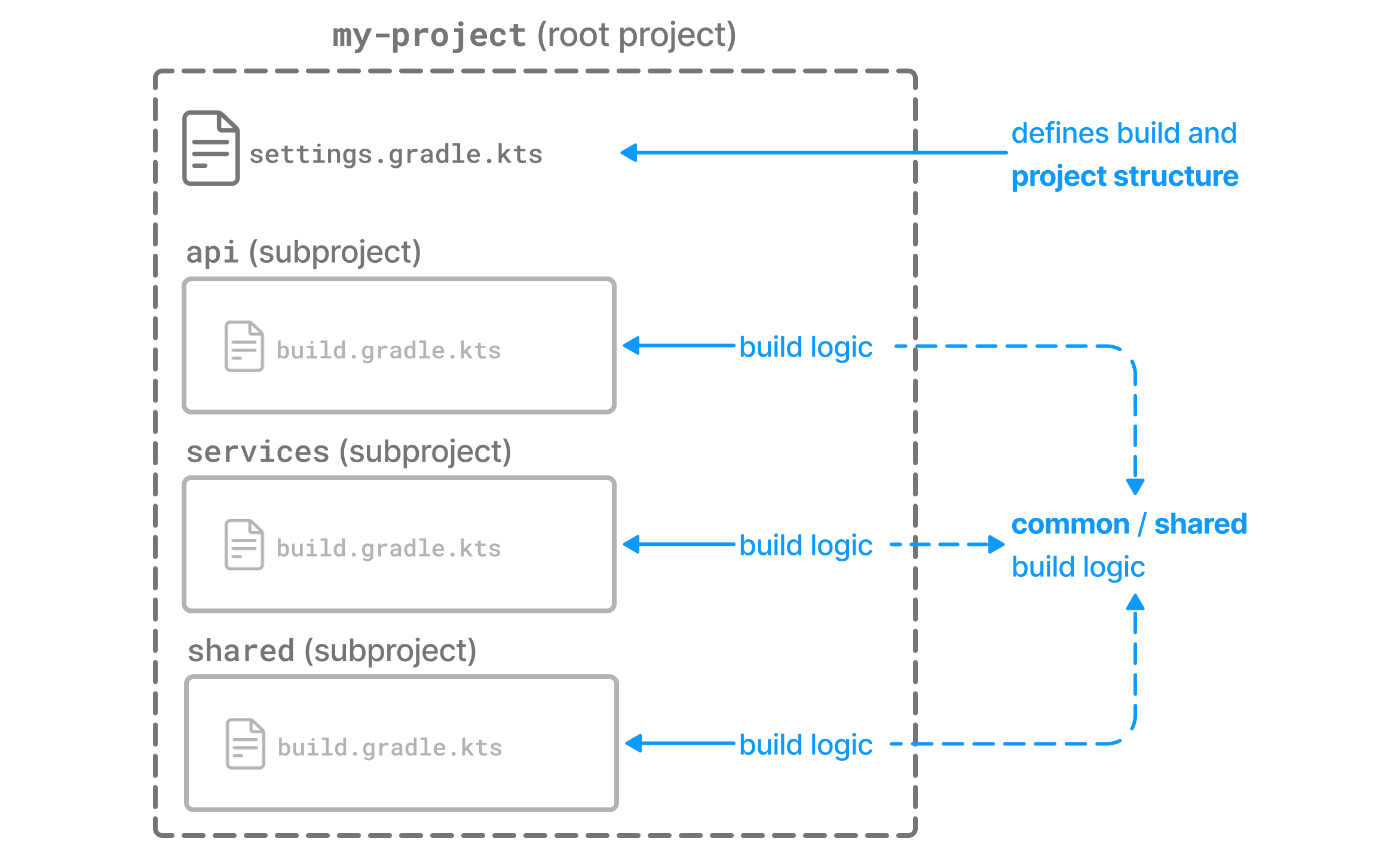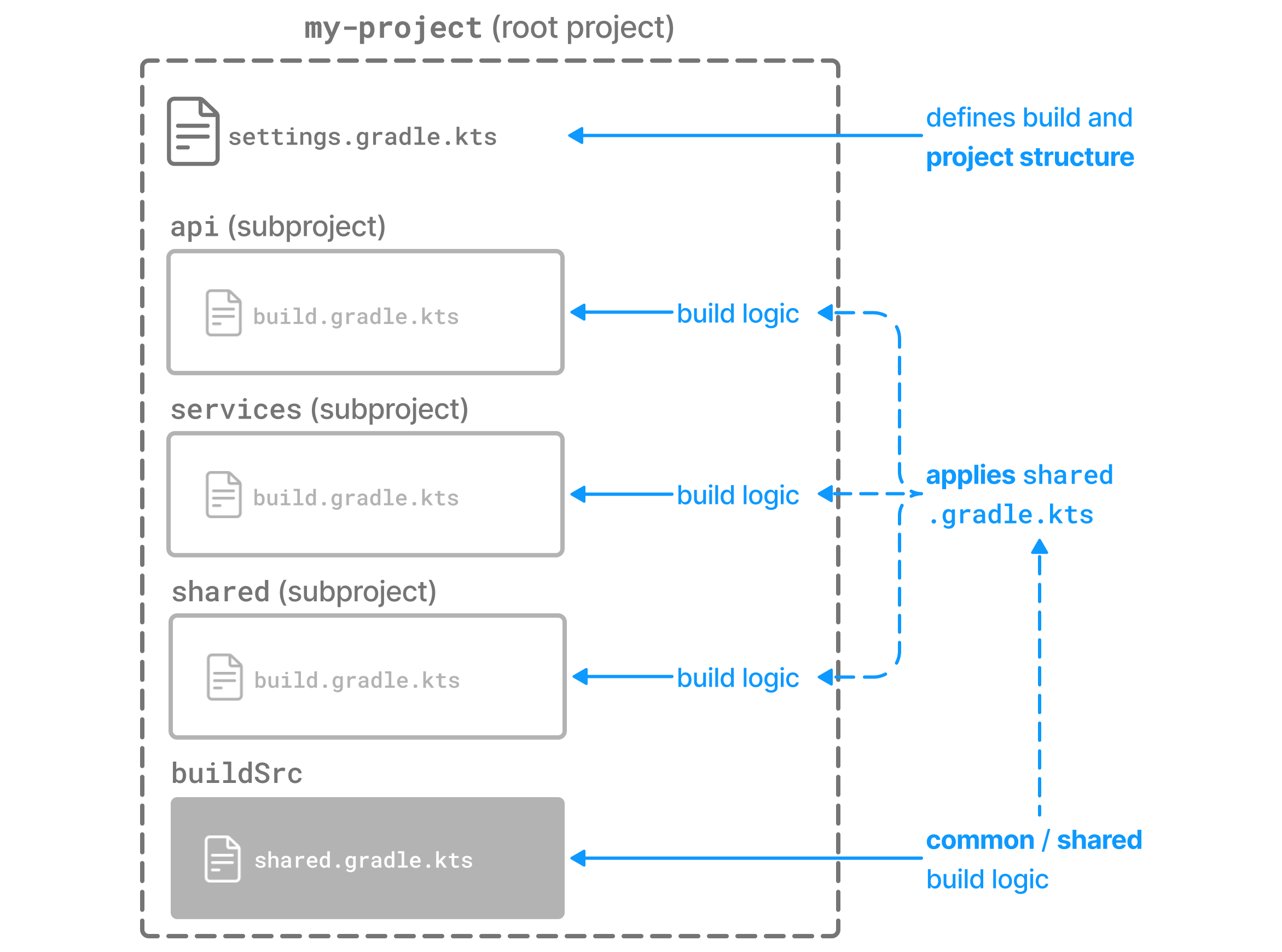Sharing Build Logic using buildSrc
Subprojects in a multi-project build often share common dependencies.
Rather than duplicating the same dependency declarations across multiple build scripts, Gradle allows you to centralize shared build logic in a special directory. This way, you can declare the dependency version in one place and have it automatically apply to all subprojects.

Using buildSrc
buildSrc is a special directory in a Gradle build that allows you to organize and share build logic, such as custom plugins, tasks, configurations, and utility functions, across all projects in your build.

Let’s take a look at an example with the following structure:
A typical multi-project build has the following layout:
.
├── api
│ ├── src/
│ └── build.gradle.kts (1)
├── services
│ ├── src/
│ └── build.gradle.kts (1)
├── shared
│ ├── src/
│ └── build.gradle.kts (1)
└── settings.gradle.kts| 1 | A build script that contains build logic, including parts that are shared with other subprojects. |
.
├── api
│ ├── src/
│ └── build.gradle (1)
├── services
│ ├── src/
│ └── build.gradle (1)
├── shared
│ ├── src/
│ └── build.gradle (1)
└── settings.gradle| 1 | A build script that contains build logic, including parts that are shared with other subprojects. |
The build file for api, services, and shared has many commonalities:
plugins {
`java-library`
}
repositories {
mavenCentral()
}
dependencies {
implementation("org.slf4j:slf4j-api:2.0.9")
implementation("com.fasterxml.jackson.core:jackson-databind:2.17.1")
testImplementation("org.junit.jupiter:junit-jupiter:5.11.3")
testRuntimeOnly("org.junit.platform:junit-platform-launcher")
}
java {
toolchain {
languageVersion = JavaLanguageVersion.of(21)
}
}
tasks.named<Test>("test") {
useJUnitPlatform()
}plugins {
`java-library`
}
repositories {
mavenCentral()
}
dependencies {
implementation("org.slf4j:slf4j-api:2.0.9")
implementation("com.google.guava:guava:32.1.2-jre")
testImplementation("org.junit.jupiter:junit-jupiter:5.11.3")
testRuntimeOnly("org.junit.platform:junit-platform-launcher")
}
java {
toolchain {
languageVersion = JavaLanguageVersion.of(21)
}
}
tasks.named<Test>("test") {
useJUnitPlatform()
}plugins {
`java-library`
}
repositories {
mavenCentral()
}
dependencies {
implementation("org.slf4j:slf4j-api:2.0.9")
implementation("com.google.guava:guava:32.1.2-jre")
testImplementation("org.junit.jupiter:junit-jupiter:5.11.3")
testRuntimeOnly("org.junit.platform:junit-platform-launcher")
}
java {
toolchain {
languageVersion = JavaLanguageVersion.of(21)
}
}
tasks.named<Test>("test") {
useJUnitPlatform()
}plugins {
id 'java-library'
}
repositories {
mavenCentral()
}
dependencies {
implementation 'org.slf4j:slf4j-api:2.0.9'
implementation 'com.fasterxml.jackson.core:jackson-databind:2.17.1'
testImplementation 'org.junit.jupiter:junit-jupiter:5.11.3'
testRuntimeOnly 'org.junit.platform:junit-platform-launcher'
}
java {
toolchain {
languageVersion = JavaLanguageVersion.of(21)
}
}
tasks.named('test', Test) {
useJUnitPlatform()
}plugins {
id 'java-library'
}
repositories {
mavenCentral()
}
dependencies {
implementation 'com.google.guava:guava:32.1.2-jre'
implementation 'org.slf4j:slf4j-api:2.0.9'
testImplementation 'org.junit.jupiter:junit-jupiter:5.11.3'
testRuntimeOnly 'org.junit.platform:junit-platform-launcher'
}
java {
toolchain {
languageVersion = JavaLanguageVersion.of(21)
}
}
tasks.named('test', Test) {
useJUnitPlatform()
}plugins {
id 'java-library'
}
repositories {
mavenCentral()
}
dependencies {
implementation 'com.google.guava:guava:32.1.2-jre'
implementation 'org.slf4j:slf4j-api:2.0.9'
testImplementation 'org.junit.jupiter:junit-jupiter:5.11.3'
testRuntimeOnly 'org.junit.platform:junit-platform-launcher'
}
java {
toolchain {
languageVersion = JavaLanguageVersion.of(21)
}
}
tasks.named('test', Test) {
useJUnitPlatform()
}To avoid duplicating build logic across api, services, and shared, we can move the shared parts into buildSrc.
This allows us to define dependencies and other configurations once and apply them uniformly to all subprojects.
For example, if you need to update the version of org.slf4j:slf4j-api:1.7.32, you only have to change it once—in the build logic inside buildSrc—rather than updating every individual build script.
Let’s expand the layout to include a buildSrc directory:
.
├── buildSrc
│ ├── src
│ │ └──main
│ │ └──kotlin
│ │ └──java-common-conventions.gradle.kts (1)
│ └── build.gradle.kts
├── api
│ ├── src/
│ └── build.gradle.kts (2)
├── services
│ ├── src/
│ └── build.gradle.kts (2)
├── shared
│ ├── src/
│ └── build.gradle.kts (2)
└── settings.gradle.kts| 1 | A shared build script. |
| 2 | Applies the shared build script. |
.
├── buildSrc
│ ├── src
│ │ └──main
│ │ └──groovy
│ │ └──java-common-conventions.gradle (1)
│ └── build.gradle
├── api
│ ├── src/
│ └── build.gradle (2)
├── services
│ ├── src/
│ └── build.gradle (2)
├── shared
│ ├── src/
│ └── build.gradle (2)
└── settings.gradle| 1 | A shared build script. |
| 2 | Applies the shared build script. |
When a buildSrc directory is present at the root of a Gradle build, Gradle treats it as a Composite Build.
Upon detecting the buildSrc directory, Gradle:
-
Treats
buildSrcas an independent Gradle project with its ownbuild.gradle(.kts)file and its ownsrc/folder. -
Compiles all classes and scripts in
buildSrc(typically undersrc/main/kotlinorsrc/main/groovy) before evaluating any other build scripts in the main build. -
Makes the compiled classes and scripts available on the classpath of all other project build scripts in the root project and subprojects.
As such, our new buildSrc has the following build file:
plugins {
`kotlin-dsl`
}
repositories {
gradlePluginPortal()
}plugins {
id 'groovy-gradle-plugin'
}
repositories {
gradlePluginPortal()
}In the buildSrc, the build script java-common-conventions.gradle(.kts) is created in src/main/kotlin or src/main/groovy.
It contains dependencies and other build information that is common to our subprojects:
plugins {
`java-library`
}
repositories {
mavenCentral()
}
dependencies {
implementation("org.slf4j:slf4j-api:2.0.9")
testImplementation("org.junit.jupiter:junit-jupiter:5.11.3")
testRuntimeOnly("org.junit.platform:junit-platform-launcher")
}
java {
toolchain {
languageVersion = JavaLanguageVersion.of(21)
}
}
tasks.named<Test>("test") {
useJUnitPlatform()
}plugins {
id 'java-library'
}
repositories {
mavenCentral()
}
dependencies {
implementation 'org.slf4j:slf4j-api:2.0.9'
testImplementation 'org.junit.jupiter:junit-jupiter:5.11.3'
testRuntimeOnly 'org.junit.platform:junit-platform-launcher'
}
java {
toolchain {
languageVersion = JavaLanguageVersion.of(21)
}
}
tasks.named('test', Test) {
useJUnitPlatform()
}If you create a script file like java-common-conventions.gradle(.kts), you can treat it as a plugin and apply it in your subprojects.
The ID of the plugin is the name of the build file without the gradle(.kts) extension.
This kind of plugin is called a convention plugin.
The shared logic is removed from the api, services, and shared build files.
And the shared plugin is applied in the files instead:
plugins {
id("java-common-conventions")
}
dependencies {
implementation("com.fasterxml.jackson.core:jackson-databind:2.17.1")
}plugins {
id("java-common-conventions")
}
dependencies {
implementation("com.google.guava:guava:32.1.2-jre")
}plugins {
id("java-common-conventions")
}
dependencies {
implementation("com.google.guava:guava:32.1.2-jre")
}plugins {
id("java-common-conventions")
}
dependencies {
implementation("com.fasterxml.jackson.core:jackson-databind:2.17.1")
}plugins {
id("java-common-conventions")
}
dependencies {
implementation("com.google.guava:guava:32.1.2-jre")
}plugins {
id("java-common-conventions")
}
dependencies {
implementation("com.google.guava:guava:32.1.2-jre")
}From now on, if you want to change something like the version of slf4j-api, you only need to update it in buildSrc, and the change will automatically apply to all subprojects.
About the buildSrc directory
buildSrc is a special, Gradle-recognized directory that provides a convenient way to organize and reuse custom build logic across your build. Gradle automatically treats it as an included build with several advantages:
-
Reusable Build Logic: You can centralize common build logic, tasks, and plugins in
buildSrc. This promotes consistency and maintainability across subprojects, as changes inbuildSrcare automatically reflected wherever its logic is used. -
Automatic Compilation and Classpath Inclusion: Gradle automatically compiles the code in
buildSrcand includes it in the classpath of all build scripts. This allows classes, plugins, and utilities defined inbuildSrcto be used directly without additional setup. -
Cleaner Build Scripts: Moving logic into
buildSrckeeps your project’s main build scripts focused and decluttered, improving readability and maintainability. -
Ease of Testing: Since
buildSrcis treated as a standalone build, you can write and run unit tests for your custom tasks and plugins just like any other project code. -
Convenient Plugin Development: If you’re writing custom Gradle plugins for internal use,
buildSrcprovides an easy way to define and use them without publishing to an external repository.
buildSrc follows the same source layout conventions as regular Java, Groovy, or Kotlin projects and has direct access to the Gradle API.
Dependencies can be declared in its own build.gradle or build.gradle.kts file.
In a multi-project build, only one buildSrc directory is allowed, and it must reside in the root project directory.
Changes to code in buildSrc will invalidate the configuration phase and require re-execution of all tasks, potentially slowing down the build.
|
Using a Composite Build Named build-logic
In addition to buildSrc, another powerful way to share build logic across subprojects is by using a dedicated composite build, typically named build-logic.
A typical multi-project build using build-logic as a composite build looks like this:
.
├── build-logic/ (1)
│ ├── build.gradle.kts
│ ├── settings.gradle.kts
│ └── src/main/kotlin
│ └── java-common-conventions.gradle.kts
├── api/
│ └── build.gradle.kts (2)
├── services/
│ └── build.gradle.kts (2)
├── shared/
│ └── build.gradle.kts (2)
└── settings.gradle.kts (3)| 1 | Standalone build logic project that defines convention plugins. |
| 2 | Applies shared plugin(s) from the composite build. |
| 3 | Includes build-logic as an included build. |
.
├── build-logic/ (1)
│ ├── build.gradle
│ ├── settings.gradle
│ └── src/main/groovy
│ └── java-common-conventions.gradle
├── api/
│ └── build.gradle (2)
├── services/
│ └── build.gradle (2)
├── shared/
│ └── build.gradle (2)
└── settings.gradle (3)| 1 | Standalone build logic project that defines convention plugins. |
| 2 | Applies shared plugin(s) from the composite build. |
| 3 | Includes build-logic as an included build. |
You can learn more in Composite Builds.
Avoid cross-project configuration using subprojects and allprojects
An improper way to share build logic between subprojects is cross-project configuration via the subprojects {} and allprojects {} DSL constructs.
With cross-project configuration, build logic can be injected into a subproject which is not obvious when looking at its build script.
In the long run, cross-project configuration usually grows in complexity and becomes a burden. Cross-project configuration can also introduce configuration-time coupling between projects, which can prevent optimizations like configuration-on-demand from working properly.
Convention plugins versus cross-project configuration
The two most common uses of cross-project configuration can be better modeled using convention plugins:
-
Applying plugins or other configurations to subprojects of a certain type.
Often, the cross-project configuration logic isif subproject is of type X, then configure Y. This is equivalent to applyingX-conventionsplugin directly to a subproject. -
Extracting information from subprojects of a certain type.
This use case can be modeled using outgoing configuration variants.
